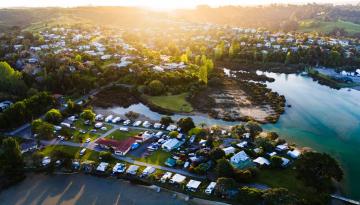Rough sleepers desperately seeking accommodation in Auckland are currently all in temporary housing, marking a "fantastic" achievement in New Zealand's battle against homelessness, according to Lifewise's chief executive.
If the pandemic has had one positive outcome, level 4 lockdown spurred housing providers into action, Jo Denvir told The AM Show, as workers rushed to get New Zealand's most vulnerable people off the streets and into temporary housing.
"The pandemic is actually what's got everyone motivated into putting rough sleepers into housing," Denvir said.
"[It's] fantastic. For the first time ever, everyone who wants to be housed in the central city is housed in temporary accommodation. I don't think that's happened before, ever. There's possibly a handful of people who aren't in housing - who don't want to be - but everyone else is."
Rough sleepers temporarily placed in motel accommodation will need to be moved to more permanent housing eventually, which will pose a new set of challenges. However, Denvir said the fact that Auckland's homeless are currently off the streets is cause for celebration.
"Right at the moment, I think we should party," she said.
"Rough sleepers haven't always wanted to engage with going into temporary accommodation, but they understand the risks... I guess once they're there, they see the benefits and they're quite happy to stay."
Youth homelessness 'the real concern'
The main concern now is the number of homeless youth in Auckland, Denvir said.
A recent count of the city's homeless population found nearly 50 percent of the people in temporary housing are aged under 18.
Lifewise's youth housing service offers housing and support for youth who don't have a safe or stable place to live, targeted at 16 to 24-year-olds who are either homeless or at a risk of becoming homeless.
There are currently 50 young people on the waiting list for emergency accommodation, Denvir revealed.
"The problem is we don't actually have any safe emergency accommodation for young people... they can be as young as 13, 16 or 17. We had a couple of children in the last lockdown who were 13," she said, noting that very few emergency housing providers are willing to take those under 18 due to their age.
Lockdown measures have raised concern regarding the potential for family harm incidents to skyrocket. Denvir acknowledged the more restrictive end of the alert level framework has caused unsafe environments for some of New Zealand's youth, contributing to the influx of teens looking for temporary housing.
"I guess it's just the stresses that are coming with everyone being locked in with their whanau for a long period of time. Job losses or reduction in hours, stress and despair around housing and food, worrying about friends and whanau, a lack of community," she explained.
"Kids are worried about their exams, they're missing their friends. All of those things combined can make a really stressful and unsafe environment at home."
In a statement last week, Manaaki Rangatahi - a collective of organisations, including Lifewise, working to tackle youth homelessness - called on the Government to make "urgent plans" to address the needs of New Zealand's most vulnerable.
The collective expressed concerns that alert level 3 may be detrimental to Auckland's youth.
"Manaaki Rangatahi collective members reported that many rangatahi were forced to live in unsafe, and unsuitable environments due to the lack of youth-specific supports and services available to address their housing needs," said the statement.
"We would like to see immediate plans put in place to open up access to safe, and supported emergency accommodation for our young people experiencing homelessness over the lockdown period.
"We are also calling on the Government to prioritise the development of a Youth Homelessness Strategy to close the pipelines into homelessness for young people."
In April, Prime Minister Jacinda Ardern acknowledged the increased access to housing options was "one of the small benefits" of the COVID-19 response.
"What we've found is that, of course, through the impacts of COVID-19, our access now to housing options has widened," she said.
"We're housing a large number of people who've been chronically homeless who have not been housed before... That has been one of the small benefits of this experience."
It was announced in April that the Government would spend more than $100 million to house the homeless in motels until they can be moved to more permanent housing. The $107.6 million boost was in addition to the money announced pre-COVID-19 in February, focused on creating additional, transitional housing for some of New Zealand's most vulnerable people.



